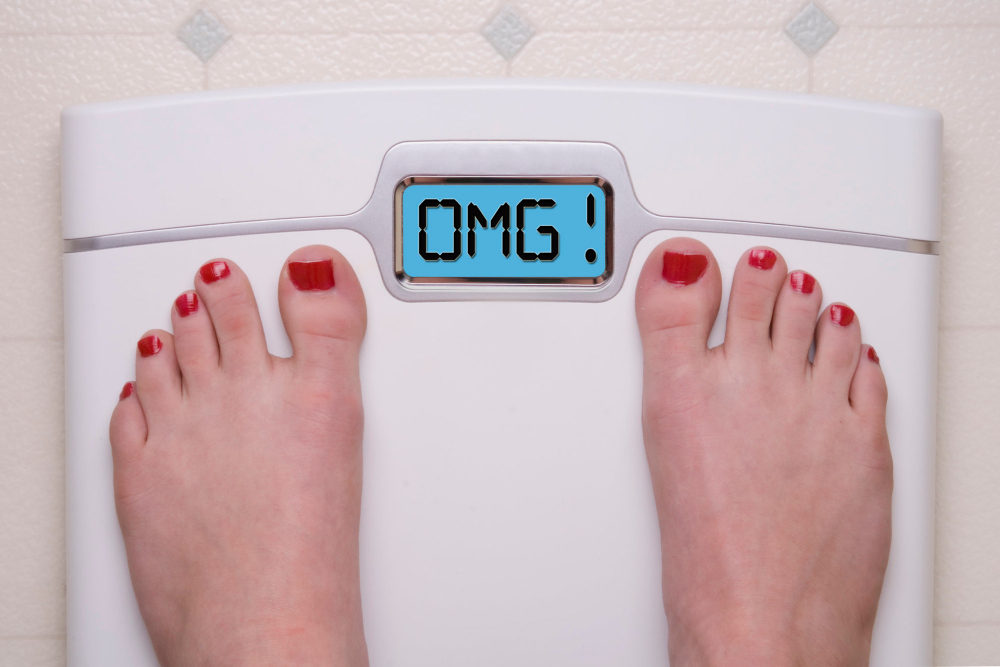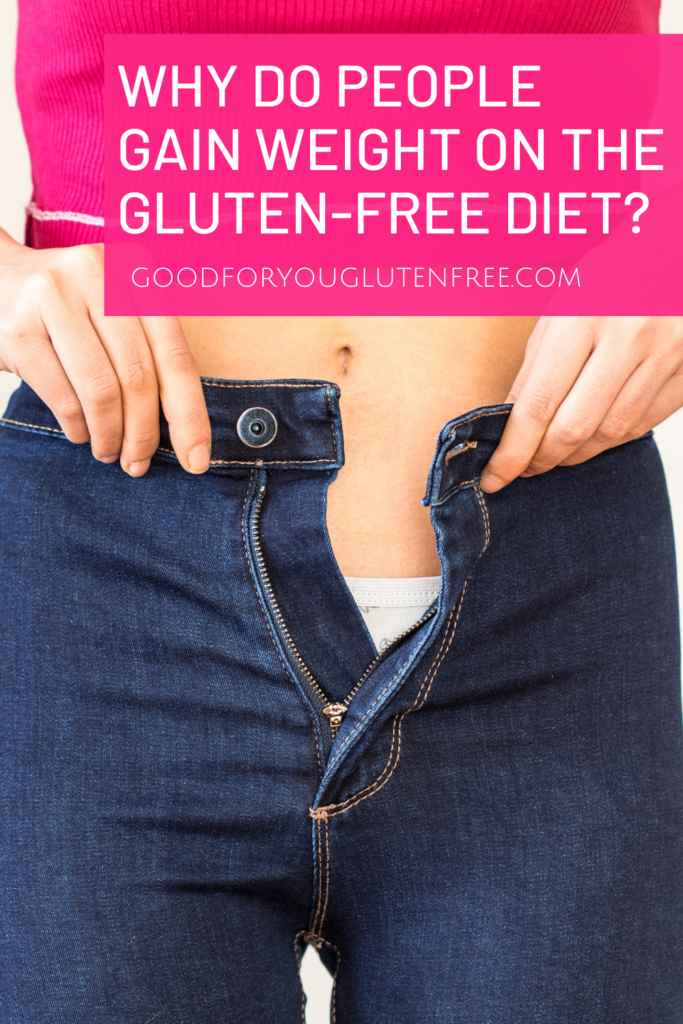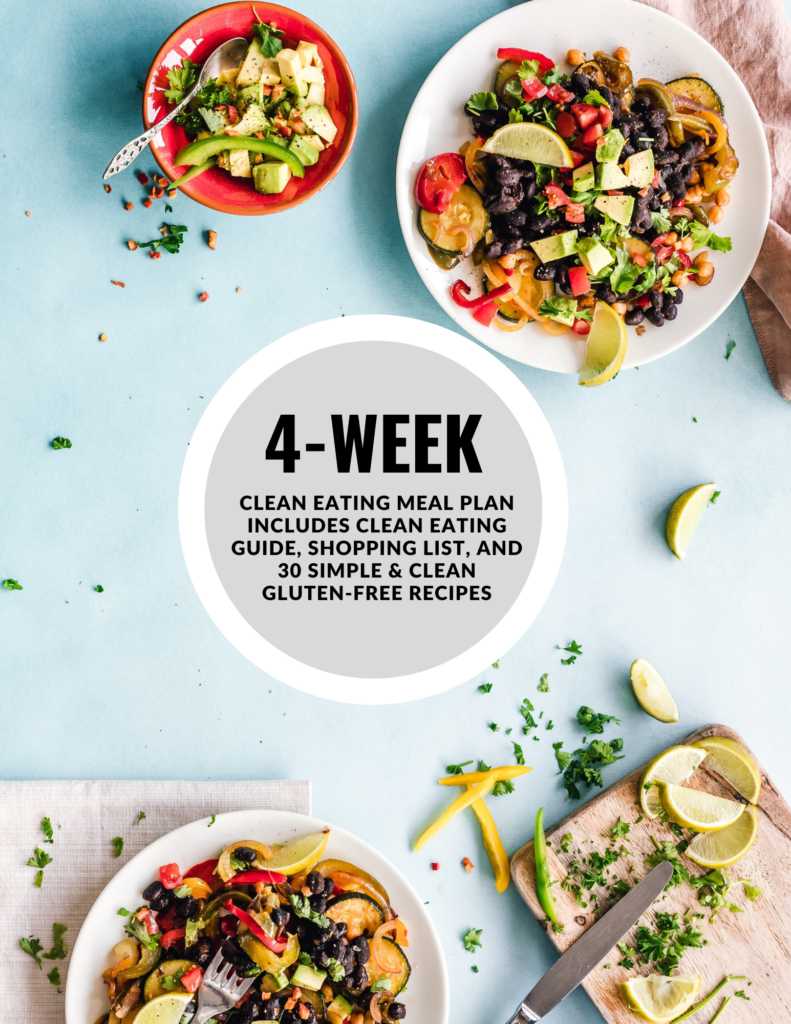
Celiac disease is a digestive disorder that affects millions of people worldwide. It’s a condition that occurs when a person can’t tolerate gluten, a protein found in wheat, barley, and rye. Celiac disease can lead to various symptoms, including weight loss, bloating, and fatigue. But can it also lead to weight gain? This article explores the connection between celiac disease and weight gain and contains affiliate links. Please see my disclosures.
Prefer to listen to this article?
Many people implement a gluten-free diet with the hope of losing weight. They think the gluten-free diet is a “fad” diet that will help them magically shed undesired pounds.
Many celebrities have turned to a gluten-free diet to help them lose weight, all of which gives gluten-free a lousy reputation.
While some celebrities may treat the diet as their ticket to get skinny fast, the truth is that a gluten-free diet is a medically-necessary “diet” for the millions of people living with celiac disease, gluten sensitivity, wheat allergies, and autoimmune disease.
While some people who voluntarily go gluten-free will shed pounds since they’re eliminating a highly-inflammatory food (gluten) and limiting what they eat, people with celiac disease will likely gain weight.
In this article, I explain five potential causes of celiac disease-related weight gain and share my tips for maintaining a healthy weight when you have celiac disease.

Weight Gain and Celiac Disease
After being diagnosed with celiac disease, I thought I would shed at least 10 pounds of unwanted weight.
One of my friends told me I was “lucky” to have celiac disease because it would make me “skinny.” (By the way, I don’t feel “lucky” to have celiac disease, nor did it magically make me skinny.)
Fast forward a few months, and not only didn’t I lose weight, but the opposite happened. I gained weight even though I had ditched an entire food group (gluten)!
I’m not alone. Approximately 81 percent of individuals with celiac disease gain weight on the gluten-free diet.
While gaining weight while eliminating gluten feels like a cruel twist of fate for people with celiac disease, it happens for several reasons.
(1) The Body is Finally Absorbing Nutrients
When someone with celiac disease goes gluten-free, their small intestine begins to heal. As a result, their small intestine once again absorbs nutrients from food, and the food starts to “stick” to their bones, so to speak.
(2) Overeating
People with celiac disease may be used to overeating because their bodies aren’t absorbing nutrients. When food wasn’t sticking to their bones, their brain would tell them to eat more to fill that nutritional gap.
Some celiacs may be overeating in an attempt to still fill a nutrient gap, and their intestines haven’t synced with their brain yet to tell them that it’s absorbing nutrients again and doesn’t need as much food.
(3) No More Fullness and Bloating
Another reason people with celiac disease gain weight after going gluten-free is because they’re used to feeling full and bloated after meals. Bloating would make it uncomfortable for them to continue eating.
However, as their body heals, they experience less and less bloating. Therefore, they may continue to eat to achieve that same feeling of fullness they once experienced after meals.

(4) Eating Too Many Packaged Foods
Another reason a person with celiac disease on a gluten-free diet may pack on the pounds is that they’re eating more packaged foods.
Gluten-free packaged foods are marketed as “health foods,” but they contain sugar and refined grains, which may fool some people into thinking they’re eating healthy when they’re just eating junk food.
(5) Feeling Deprived
When someone feels deprived of their favorite foods, they may overcompensate for this loss by stocking up on calorically-dense foods at the grocery store or eating an entire gluten-free pizza because it’s in front of them.
How to Maintain a Healthy Weight
Remember, a gluten-free diet isn’t a weight loss diet for the millions of people with celiac disease and gluten intolerance.
To maintain a healthy weight, people with celiac disease on a gluten-free diet need to employ these basic principles of healthy eating:
(1) Load Up on Vegetables and Fruits
Fruits and vegetables are loaded with nutrients, fiber, and antioxidants, all of which contribute to healing and make a person feel full and satiated.
At every meal, a person should strive to fill half of their plate with fruits and vegetables and snack on green juices and fruit (i.e., apple with peanut butter), too.
By loading up on fruits and vegetables, a person will feel full and satiated and replenish their once-depleted nutrient tank.
(2) Meal Planning
Meal planning is essential to eating right, maintaining a healthy weight, and staying on track with a strict gluten-free diet.
I’ve written extensively about meal planning in my article, 15 Essential Gluten-Free Meal Planning Strategies for People with Celiac Disease and Gluten Intolerance.
I also created gluten-free meal planning and recipe packs to help my gluten-free friends get started with meal planning and making healthy gluten-free meals.
(3) Avoid the Packaged Foods Trap
A gluten-free donut still contains sugar, refined grains, and excessive calories. To add insult to injury, many gluten-free products contain more calories and sugar to compensate for the missing gluten.
Remember, gluten is the “glue” that gives baked goods that desirable chewy and stretchy texture. To mimic the taste and texture of gluten in gluten-free baked goods, product manufacturers add more sugar, starches, and fillers.
While it’s okay to enjoy gluten-free junk foods and sweets in moderation, someone experiencing weight gain may need to examine their relationship with sugar and packaged foods.
(4) Heal Thy Gut
Poor gut health has been linked to inflammation, weight gain or an inability to lose weight, and poor health outcomes in all humans, not just people with celiac disease.
People with celiac disease, especially poorly managed celiac disease, may continue to suffer from poor gut health long after implementing a gluten-free diet.
In one fascinating study, researchers fed mice gut bacteria from human identical twins; one was obese, and the other was thin. They transferred the bacteria into the guts of mice and found that bacteria from the obese person caused the mice to become fat while the bacteria from the lean person did not.
I recommend my clients take the Heal Your Gut Challenge to help improve their gut health.
(5) Check for Other Food Sensitivities
If someone has ditched gluten and eats a [mostly] healthy diet, yet they still struggle to lose or maintain a healthy weight, they might have an additional food sensitivity causing them to retain inflammation weight.
A food sensitivity test can be a first step in identifying other food sensitivities, although food sensitivity tests should be taken with a grain of salt.
Sometimes these tests come back positive for dozens of foods, which likely means a person has a leaky gut vs. a food intolerance. Once a gut is healed and sealed, a food sensitivity will likely reveal only a couple of food sensitivities, if any.
However, if a food sensitivity test comes back with only a few foods, a person should consider eliminating those foods for 4-6 weeks, then reintroducing them to see how they feel. I recommend working with a nutrition professional to help.
(6) Practice Self Care
Being healthy is about more than just what someone puts in their mouth. It requires a person to stress less, exercise regularly, and get plenty of fresh air and playtime.
Chances are, after breaking up with gluten, a person with celiac disease will begin to feel better. Maybe their painful bloating subsides, and they have more energy because they’re finally absorbing nutrients from their food.
I recommend they use this newfound diet to implement healthy lifestyle changes that, combined with a healthy diet, can profoundly impact their overall health.

(7) Eat Zero Gluten
Many people say they’re eating primarily gluten-free and can’t resist “just a little gluten” here and there, or they’re eating foods with hidden gluten or highly cross-contaminated with gluten.
The only way to truly see the benefits of a gluten-free diet is by eating zero gluten. None. Nadda. Zip. Zilch. No cheating, ever.
Remember, a person can’t lose inflammation weight if they’re still inflamed because they’re sneaking gluten into their diet.
The Bottom Line
Some people with celiac disease will gain weight as their bodies adjust to a gluten-free diet. It’s normal, natural, and even welcome in people who have struggled to maintain a healthy weight due to chronic diarrhea and malabsorption issues.
However, if someone is packing on the pounds after going gluten-free, they should closely examine how much they’re eating, the types of foods they’re eating, and their gut health. All of these factors impact weight.
New to Celiac? Need Help?
If you’re new to celiac disease, I can help you.
Consider enrolling in my SIGNATURE Gluten-Free Course to learn the ins and outs of how to do gluten-free right. Much of the course is focused on continued care and healing.
If you want to work with a health coach to help you maintain a healthy weight, please consider signing up for a 1-on-1 gluten-free nutrition coaching session with me.
Additional Reading
- Download: Gluten-Free Clean Eating Meal Plan
- Will I Lose Weight on a Gluten-Free Diet? 8 Ways Ditching Gluten Contributes to Weight Loss
- Does Heat Kill Gluten?
- What is Gluten and Why is it Bad for Some People?
- Supplements for Celiac Disease and Gluten Intolerance
- 12+ Must Read Books about Celiac Disease and Gluten-Free Living

Leave a Comment